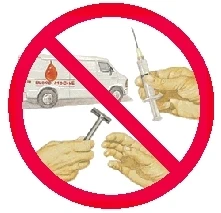Hepatitis means inflammation of the liver. There are many kinds of hepatitis. Some can be spread. Others are not. Hepatitis C virus (HCV) does spread. It can lead to lifelong liver disease. This includes chronic hepatitis, cirrhosis, liver failure, and liver cancer.

Symptoms of Hepatitis C
Most people notice no problems until they develop liver disease years later. Symptoms include the following:
- Flulike problems (fatigue, nausea, vomiting, diarrhea, and sore muscles and joints)
- Tenderness in the upper right abdomen
- Jaundice (yellowing skin)
- Swelling in the abdomen
- Itching
- Dark urine
How HCV Spreads
HCV spreads through exposure to an infected person’s blood. This is most likely to occur if:
- You used an infected needle (IV drug needles, tattoos, acupuncture needles, and body piercing)
- You had a needlestick injury in the hospital
- You shared personal care items such as razors
- You had sex without a condom with an infected person (a less common cause)
- You had a blood transfusion several years ago (blood is now screened for HCV)
Many people do not know how they were exposed to HCV.
Prevent the Spread
No vaccine can prevent the spread of HCV and hepatitis C. It's up to you to keep others safe.
Do
- Cover all skin breaks and sores yourself. If you need help, the person treating you should wear latex gloves.
- Use condoms during sex, especially with a new partner.
Don't
- Don't donate blood, plasma, body organs, other body tissue, or sperm.
- Don't share needles.
- Don't share razors, toothbrushes, manicure tools, or other personal items.
